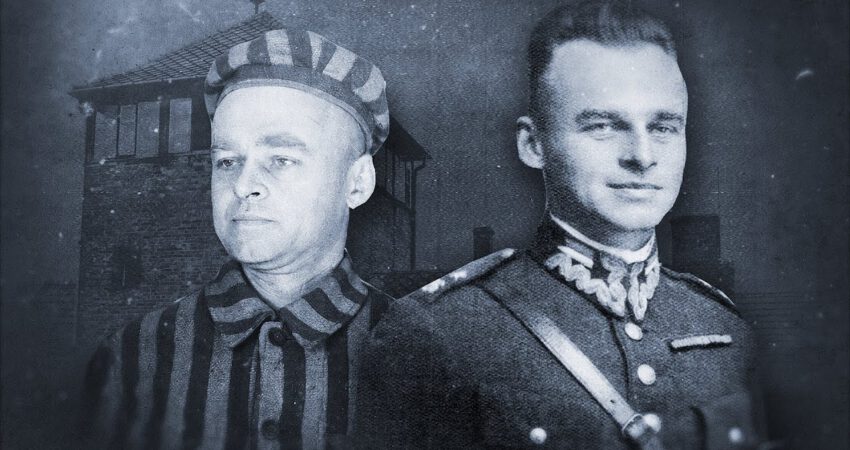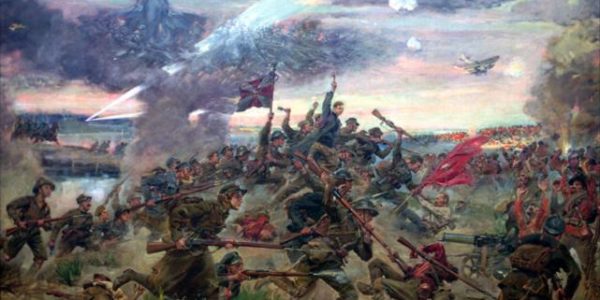By Beata Bruggeman-Sękowska
On September 19, 1940 Witold Pilecki, a member of the Secret Polish Army, let himself get caught and arrested by German policemen in Warsaw in order to be sent to Auschwitz death camp. His intention was to infiltrate the camp, set up a resistance network there and gather information about the death camp.
“Witold’s Report”
He organized a resistance movement in 1941 in Auschwitz camp called ZOW (Związek Organizacji Wojskowej – Military Organization Union) and informed the Western Alllies about Nazi Germany’s Auschwitz atrocities. The “Witold’s Report” became the first ever comprehensive account of the Holocaust from a firsthand witness.
On the night of April 26th/27th, 1943, he succeeded in escaping with two other inmates. Witold Pilecki escaped from the camp after nearly two and a half years of imprisonment. Several days later, Witold Pilecki contacted the Home Army and it became clear that they would need help to infiltrate and rescue the inmates. In 1944, the Russian army, despite being within attacking distance of the camp, showed no interest in a joint effort with the Home Army and the ZOW to free them. In February 1944, Pilecki joined a secret organisation, NIE formed as a clandestine organization within the Home Army with the goal of preparing resistance against a possible Soviet occupation. Pilecki took part in the Warsaw Uprising in August 1944.
Communism and show trial
He remained loyal to the London-based Polish government-in-exile after the Soviet-backed communist takeover of Poland. As relations between wartime government-in-exile and the Soviet-backed Polish Committee of National Liberation worsened, in September 1945, Pilecki accepted orders from General Władysław Anders, commander of the 2nd Polish Corps to return to Poland under a false identity and gather intelligence to be sent to the government-in-exile.
Pilecki returned to the country in October 1945, where he proceeded to organize his intelligence network. When it became clear that Poland would not be free the Polish government-in-exile ordered the remaining active members of the Polish resistance (who became known as the damned soldiers) to either return to their normal civilian lives or escape to the West. In July, Pilecki was informed that his cover was blown and ordered to leave. But he declined. In April 1947, he began collecting evidence of Soviet atrocities in Poland as well as the arrest and prosecution of former members of the Home Army and Polish Armed Forces in the West, which often resulted in execution or imprisonment.
He was arrested in 1947 by the Stalinist secret police ( Urzad Bezpieczenstwa) on charges of working for “foreign imperialism”. On March 3rd, 1948, a show trial took place. Testimony against Pilecki was presented by a future Polish prime minister, Józef Cyrankiewicz, himself an Auschwitz survivor. Pilecki was accused of illegal border crossing, use of forged documents, not enlisting with the military, carrying illegal arms, espionage for General Władysław Anders, espionage for “foreign imperialism” (thought to be British intelligence) and planning to assassinate several officials of the Ministry of Public Security of Poland.
Pilecki denied the assassination charges, as well as espionage, although he admitted to passing information to the 2nd Polish Corps, of which he considered himself an officer and thus claimed that he was not breaking any law. He pleaded guilty to the other charges. On May 15th, with three of his comrades, he was sentenced to death. Ten days later, on May 25th, 1948, Pilecki was executed at the Mokotów Prison, by Staff Sergeant Piotr Śmietański, nicknamed “The Butcher of Mokotów Prison” by the inmates. His final words before his execution were “Long live free Poland”
No one knows where Witold Pilecki was buried since place of burial has never been found however it is thought to be somewhere within Warsaw’s Powązki Cemetery.
Recognition
Until 1989, information about Pilecki was illegal and surpressed. In 1990, Witold Pilecki and all others sentenced in the show trial were finally absolved of all charges. In 1995, he was posthumously awarded the Order of Polonia Restituta and in 2006 he received the Order of the White Eagle, the highest Polish decoration. On September 6th, 2013, he was posthumously promoted by the Minister of National Defence to the rank of Colonel.
The European Parliament adopted in connection with the 80th anniversary of the outbreak of WWII on September 20 a resolution to establish on May 25 – the same date as the anniversary of the execution of the Auschwitz hero, Rotamaster Witold Pilecki, The International Day of Heroes of the Fight Against Totalitarianism.
Image and more info: https://instytutpileckiego.pl/en/instytut/patron?setlang=1
Article has been published by the Central and Eastern Europe Center and has been republished with permission https://www.communications-unlimited.nl/witold-pilecki-and-the-first-ever-comprehensive-report-on-nazi-germanys-auschwitz-atrocities/




Follow Us!